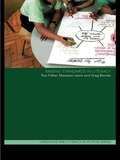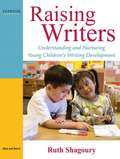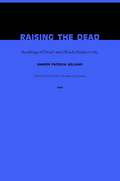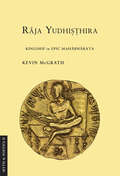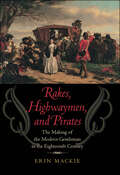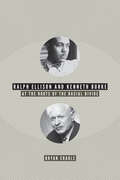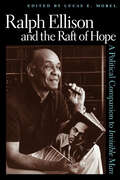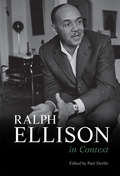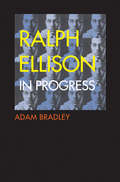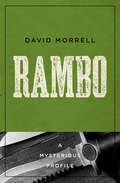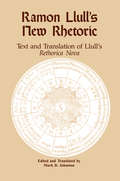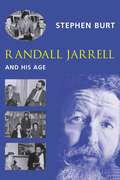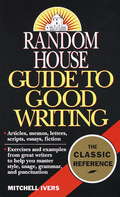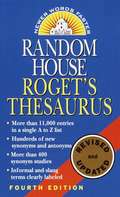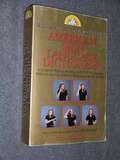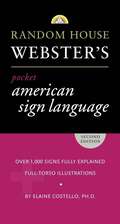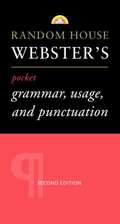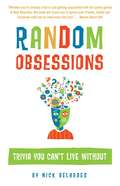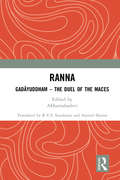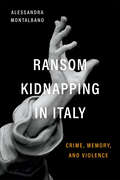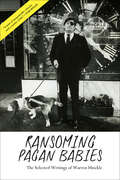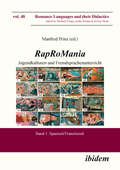- Table View
- List View
Raising Standards in Literacy (Language and Literacy in Action)
by Maureen Lewis Ros Fisher Greg BrooksRaising Standards in Literacy represents the best current thinking and research about literacy. The book is the outcome of a high-profile series of seminars on raising standards in literacy, and includes contributions from an impressive group of international researchers and policymakers. By offering a rich and unique mix of contemporary perspectives on literacy education, this book provides an invaluable source of study and insight into the latest research and developments in the teaching of literacy. It includes sections on: * how research into literacy teaching can inform new approaches found in England, the USA and Australia* the ways in which literacy education is developing in England, the USA and Australia* the issues involved in assessing progress in literacy and the validity of research claims made about standards of attainment. The book celebrates the apparent success of current literacy initiatives at the same time as raising questions about the feasibility and relevance of such initiatives to the literacy co-ordinators and consultants and for all those undertaking further study or research in literacy education.
Raising Writers
by Ruth E. ShagouryWith the guidance of children's writing enthusiast Ruth Shagoury, teachers will learn to listen toalltheir students and look at their written work with a new and appreciative lens-one that also helps them anticipate and encourage students in developing new skills appropriately. Drawing on her many years of primary classroom teaching and research, Ruth offers primary teachers, early childhood specialists, and caregivers strategies to nurture connections between oral and writing skills at every stage of children's development for today's multicultural classroom. Ruth's thorough exploration of how young children learn written language presents teachers with the necessary tools to understand the growth and development of written language in a literate culture. Filled with a wealth of resources for extending learning beyond the classroom, Raising Writers: Understanding and Nurturing Young Children's Writing Development includes interviews with the author and book study questions making this a perfect book for book club study groups. Help your students make the transition from oral to written language! Explores the written language development of pre-school through primary school age children. Addresses important topics such as the role of the culture of literacy, how drawing and writing go hand-in hand, and the developmental path of spelling and conventions. Identifies the parallels between oral and written language development with the use of a developmental continuum chart. In addition, the book includes an annotated guide with research foundation for the continuum. Includes numerous samples of children's work and photos to bring the information in the book to life. Offers book recommendations for spelling programs and additional writing instruction resources, as well as picture book suggestions for multicultural classrooms. Includes a book club study guide at the end of the book.
Raising the Dead: Readings of Death and (Black) Subjectivity
by Sharon Patricia HollandRaising the Dead is a groundbreaking, interdisciplinary exploration of death's relation to subjectivity in twentieth-century American literature and culture. Sharon Patricia Holland contends that black subjectivity in particular is connected intimately to death. For Holland, travelling through "the space of death" gives us, as cultural readers, a nuanced and appropriate metaphor for understanding what is at stake when bodies, discourses, and communities collide. Holland argues that the presence of blacks, Native Americans, women, queers, and other "minorities" in society is, like death, "almost unspeakable. " She gives voice to--or raises--the dead through her examination of works such as the movie Menace II Society, Toni Morrison's novel Beloved, Leslie Marmon Silko's Almanac of the Dead, Randall Kenan's A Visitation of Spirits, and the work of the all-white, male, feminist hip-hop band Consolidated. In challenging established methods of literary investigation by putting often-disparate voices in dialogue with each other, Holland forges connections among African-American literature and culture, queer and feminist theory. Raising the Dead will be of interest to students and scholars of American culture, African-American literature, literary theory, gender studies, queer theory, and cultural studies.
Raja Yudhisthira: Kingship in Epic Mahabharata (Myth and Poetics II)
by Kevin McGrathIn Raja Yudhisthira, Kevin McGrath brings his comprehensive literary, ethnographic, and analytical knowledge of the epic Mahabharata to bear on the representation of kingship in the poem. He shows how the preliterate Great Bharata song depicts both archaic and classical models of kingly and premonetary polity and how the king becomes a ruler who is viewed as ritually divine. Based on his precise and empirical close reading of the text, McGrath then addresses the idea of heroic religion in both antiquity and today; for bronze-age heroes still receive great devotional worship in modern India and communities continue to clash at the sites that have been—for millennia—associated with these epic figures; in fact, the word hero is in fact more of a religious than a martial term.One of the most important contributions of Raja Yudhisthira, and a subtext in McGrath's analysis of Yudhisthira's kingship, is the revelation that neither of the contesting moieties of the royal Hastinapura clan triumphs in the end, for it is the Yadava band of Krsna who achieve real victory. That is, it is the matriline and not the patriline that secures ultimate success: it is the kinship group of Krsna—the heroic figure who was to become the dominant Vaisnava icon of classical India—who benefits most from the terrible Bharata war.
Rakes, Highwaymen, and Pirates: The Making of the Modern Gentleman in the Eighteenth Century
by Erin MackieErin Mackie explores the shared histories of the modern polite English gentleman and other less respectable but no less celebrated eighteenth-century masculine types: the rake, the highwayman, and the pirate.Mackie traces the emergence of these character types to the seventeenth and early eighteenth centuries, when traditional aristocratic authority was increasingly challenged. She argues that the development of the modern polite gentleman as a male archetype can only be fully comprehended when considered alongside figures of fallen nobility, which, although criminal, were also glamorous enough to reinforce the same ideological order.In Evelina’s Lord Orville, Clarissa’s Lovelace, Rookwood’s Dick Turpin, and Caleb Williams's Falkland, Mackie reads the story of the ideal gentleman alongside that of the outlaw, revealing the parallel lives of these seemingly contradictory characters. Synthesizing the histories of masculinity, manners, and radicalism, Rakes, Highwaymen, and Pirates offers a fresh perspective on the eighteenth-century aristocratic male.
Rakes, Highwaymen, and Pirates: The Making of the Modern Gentleman in the Eighteenth Century
by Erin MackieA study of the depiction and development of masculine figures in eighteenth-century British literature.Erin Mackie explores the shared histories of the modern polite English gentleman and other less respectable but no less celebrated eighteenth-century masculine types: the rake, the highwayman, and the pirate.Mackie traces the emergence of these character types to the seventeenth and early eighteenth centuries, when traditional aristocratic authority was increasingly challenged. She argues that the development of the modern polite gentleman as a male archetype can only be fully comprehended when considered alongside figures of fallen nobility, which, although criminal, were also glamorous enough to reinforce the same ideological order.In Evelina’s Lord Orville, Clarissa’s Lovelace, Rookwood’s Dick Turpin, and Caleb Williams's Falkland, Mackie reads the story of the ideal gentleman alongside that of the outlaw, revealing the parallel lives of these seemingly contradictory characters. Synthesizing the histories of masculinity, manners, and radicalism, Rakes, Highwaymen, and Pirates offers a fresh perspective on the eighteenth-century aristocratic male.“In this well-researched study, Mackie makes a strong case for the inclusion of alternative, criminal masculinities in understanding the development of the modern English gentleman and patriarchy in the eighteenth century. Situated at the nexus of gender theory and literary studies, her book adds to the study of modern and late modern cultural norms of gender and sexuality through discourse analysis of literary and nonliterary texts.” —Srividhya Swaminathan, Journal of British Studies“The topic is lively, the writing clear, and the argument persuasive. Bringing together histories of criminality, of gender, and of manners cuts across the period in a new way that promises to produce lively debate.” —James Thompson, University of North Carolina at Chapel Hill“The central concern of this book is the transformation of the “British gentleman” from the so-called Glorious Revolution through reformulations of patriarchy as exhibited in taste, sensibility, and virtue in the 18th century and beyond.” —Choice
Ralph Ellison and Kenneth Burke: At the Roots of the Racial Divide
by Bryan CrableRalph Ellison and Kenneth Burke focuses on the little-known but important friendship between two canonical American writers. The story of this fifty-year friendship, however, is more than literary biography; Bryan Crable argues that the Burke-Ellison relationship can be interpreted as a microcosm of the American "racial divide." Through examination of published writings and unpublished correspondence, he reconstructs the dialogue between Burke and Ellison about race that shaped some of their most important works, including Burke's A Rhetoric of Motives and Ellison's Invisible Man. In addition, the book connects this dialogue to changes in American discourse about race. Crable shows that these two men were deeply connected, intellectually and personally, but the social division between white and black Americans produced hesitation, embarrassment, mystery, and estrangement where Ellison and Burke might otherwise have found unity. By using Ellison’s nonfiction and Burke’s rhetorical theory to articulate a new vocabulary of race, the author concludes not with a simplistic "healing" of the divide but with a challenge to embrace the responsibility inherent to our social order.American Literatures Initiative
Ralph Ellison and the Raft of Hope: A Political Companion to Invisible Man
by Lucas E. Morel“This superb [essay] collection enables readers of Invisible Man to appreciate the subtleties of its cultural and political commentary.” —Journal of American StudiesAn important collection of original essays that examine how Ellison’s landmark novel, Invisible Man (1952), addresses the social, cultural, political, economic, and racial contradictions of America. Commenting on the significance of Mark Twain’s writings, Ralph Ellison wrote that “a novel could be fashioned as a raft of hope, perception and entertainment that might help keep us afloat as we tried to negotiate the snags and whirlpools that mark our nation’s vacillating course toward and away from the democratic ideal.” Ellison believed it was the contradiction between America’s “noble ideals and the actualities of our conduct” that inspired the most profound literature?”the American novel at its best.”Drawing from the fields of literature, politics, law, and history, the contributors make visible the political and ethical terms of Invisible Man , while also illuminating Ellison’s understanding of democracy and art. Ralph Ellison and the Raft of Hope uniquely demonstrates why Invisible Man stands as a premier literary meditation on American democracy.“Essential reading for anyone interested in understanding Ellison’s political thought.” —Lawrence Jackson, author of Ralph Ellison: Emergence of Genius“Outstanding. . . . Provides an interdisciplinary perspective of the politics of the book.” —Lexington Herald-Leader“These essays . . . demonstrate that a great work of art has the capacity to renew itself across generations.” —Pamela K. Jensen, Kenyon College“This careful study of Ellison’s great novel is highly recommended for all serious students of American and African American literature.” —African American Review
Ralph Ellison in Context (Literature in Context)
by Paul DevlinRalph Ellison's Invisible Man is the second-most assigned American novel since 1945 and is one of the most enduring. It is studied by many thousands of high school and college students every year and has been since the 1950s. His landmark essays, with their blend of personal history and cultural theory, have been extraordinarily influential. Ralph Ellison in Context includes authoritative chapters summing up longstanding conversations, while offering groundbreaking essays on a variety of topics not yet covered in the copious critical and biographical literature. It provides fresh perspectives on some of the most important people and places in Ellison's life, and explores where his work and biography cross paths with some of the pressing topics of his time. It includes chapters on Ellison's literary influences and offers a definitive overview of his early writings. It also provides an overview of Ellison's reception and reputation from his death in 1994 through 2020.
Ralph Ellison in Progress: From Invisible Man to Three Days Before the Shooting ...
by Adam BradleyRalph Ellison may be the preeminent African-American author of the twentieth century, though he published only one novel, 1952's Invisible Man. He enjoyed a highly successful career in American letters, publishing two collections of essays, teaching at several colleges and universities, and writing dozens of pieces for newspapers and magazines, yet Ellison never published the second novel he had been composing for more than forty years. A 1967 fire that destroyed some of his work accounts for only a small part of the novel's fate; the rest is revealed in the thousands of pages he left behind after his death in 1994, many of them collected for the first time in the recently published. Three Days Before the Shooting. ... Ralph Ellison in Progress is the first book to survey the expansive geography of Ellison's unfinished novel while re-imaging the more familiar, but often misunderstood, territory of Invisible Man. It works from the premise that understanding Ellison's process of composition imparts important truths not only about the author himself but about race, writing, and American identity. Drawing on thousands of pages of Ellison's journals, typescripts, computer drafts, and handwritten notes, many never before studied, Adam Bradley argues for a shift in scholarly emphasis that moves a greater share of the weight of Ellison's literary legacy to the last forty years of his life and to the novel he left forever in progress.
Rambo: A Mysterious Profile (Mysterious Profiles)
by David MorrellThe New York Times–bestselling author tells the story behind the creation of his iconic character during an era of violence and polarization in America. In an era when the Vietnam War raged and police and protestors battled in the streets, a young writer introduced Rambo—a disillusioned and angry trained killer who&’d returned to America a ticking time bomb—in a novel called First Blood. The character would go on to appear in a wildly popular action film in which he led the authorities on an extraordinary manhunt, as well as in several sequels. Here, award–winning author David Morrell reveals the origins of the now world-famous figure and the influences that shaped him in this surprising and candid essay. Previously published under the title Rambo and Me
Ramon Llull's New Rhetoric: Text and Translation of Llull's rethorica Nova
by Mark D. JohnstonModern histories of medieval culture often assert without qualification that the oral exercise of public eloquence during the European Middle Ages was limited to preaching by the clergy. The classical art of rhetoric supposedly survived only as a written subject for study in the schools. During the past thirty years, however, knowledge of medieval rhetorical theory and practice has grown tremendously. Historians and philologians have devoted particular attention to the relationship between oral and written communication in medieval Europe. Their investigations are beginning to suggest -- not surprisingly -- that interest in eloquence was not confined to the schools or clergy. Secular officials arguing in princely courts or town halls, and laypeople seeking to develop their learning or piety also cultivated an interest in rhetoric. Given the paucity of testimony available, the New Rhetoric of the Mallorcan lay theologian and philosopher Ramon Llull (1232-1316) offers an exceptional witness to the non-academic and non-clerical concern for eloquence. His proposals for new Christian arts of communication are among the best evidence available for assessing the diffusion of rhetorical doctrines from the cloisters and schools into the courts, town halls, and private chapels of Western Europe around 1300. Growing interest in Llull's work and in medieval rhetoric have combined to produce this first published edition. The first part on order shows how Llull's entire program attempts to correlate ethical, metaphysical, and linguistic categories into a single system of Anselmian "rightness." The next section on beauty could almost form a complete art of preaching in itself, thanks to the brief compilations of sermon material that it includes. The broad range of discursive elements and techniques in which Llull seeks verbal beauty makes this section very eclectic in scope. Part three on knowledge attempts to explain the diffusion of right linguistic and rhetorical doctrine almost exclusively through the Divine Dignities and other categories of the Great Art. The final section on love consists of ten proverbs regarding loving speech, each explicated with an appropriate exemplum.
Randall Jarrell and His Age
by Stephanie BurtRandall Jarrell (1914–1965) was the most influential poetry critic of his generation. He was also a lyric poet, comic novelist, translator, children's book author, and close friend of Elizabeth Bishop, Robert Lowell, Hannah Arendt, and many other important writers of his time. Jarrell won the 1960 National Book Award for poetry and served as poetry consultant to the Library of Congress. Amid the resurgence of interest in Randall Jarrell, Stephen Burt offers this brilliant analysis of the poet and essayist.Burt's book examines all of Jarrell's work, incorporating new research based on previously undiscovered essays and poems. Other books have examined Jarrell's poetry in biographical or formal terms, but none have considered both his aesthetic choices and their social contexts. Beginning with an overview of Jarrell's life and loves, Burt argues that Jarrell's poetry responded to the political questions of the 1930s, the anxieties and social constraints of wartime America, and the apparent prosperity, domestic ideals, and professional ideology that characterized the 1950s. Jarrell's work is peopled by helpless soldiers, anxious suburban children, trapped housewives, and lonely consumers. Randall Jarrell and His Age situates the poet-critic among his peers—including Bishop, Lowell, and Arendt—in literature and cultural criticism. Burt considers the ways in which Jarrell's efforts and achievements encompassed the concerns of his time, from teen culture to World War II to the Cuban Missile Crisis; the book asks, too, how those efforts might speak to us now.
Random House Guide to Good Writing
by Mitchell IversClear, concise, effective, THE RANDOM HOUSE GUIDE TO GOOD WRITING is for anyone who wishes to communicate well in writing. Mitchell Ivers shows us how to master the medium and the message with an array of features: Precise guidelines on word usage, grammar, and punctuation--and how to decide with "rules" you can discard to suit your purpose; How to choose the tone and style appropriate to your audience and subject; The essential components of plot in fiction and structure in nonfiction, and much more.An Alternate Selection of the Book-of-the-Month ClubA Main Selection of the Writer's Digest Book ClubFrom the Paperback edition.
Random House Roget's Thesaurus (4th Edition, Revised and Updated)
by Random HouseContaining more than 11,000 main entries, this handy, alphabetically arranged thesaurus offers more than 200,000 synonyms and antonyms grouped by meanings, fields of interest, and levels of formality, as well as more than 400 synonym studies and a section of new words.
Random House Webster's American Sign Language Dictionary
by Elaine Costello Lois Lenderman Paul M. Setzer Linda C. TomThis dictionary is the only one that makes it easy for you to match the right signs with the right meanings by giving you: alternate signs for the same meaning, plus different signs for different meanings of the same word complete definitions that show you which meanings go with which signs over 3,000 cross references to the illustrated signs
Random House Webster's Pocket American Sign Language Dictionary
by Elaine CostelloThe Random House Webster’s Pocket American Sign Language Dictionary is a treasury of over 1,000 signs for the novice and experienced user alike. It includes complete descriptions of each sign, plus full-torso illustrations. There is also a subject index for easy reference as well as alternate signs for the same meaning.
Random House Webster's Pocket Grammar, Usage, and Punctuation
by Random HouseRandom House's completely revised best-selling guide to good English. Random House Webster's Pocket Grammar, Usage, and Punctuationis perfect for students, business, and anyone who cares about the correct use of English. Includes: • Clear and concise explanations of English grammar with plenty of examples • Common grammatical and stylistic errors and how to avoid them • Quick reference to commonly misspelled words • User-friendly guide to punctuation and capitalization • Easily confused words and...
Random Obsessions
by Brad Listi Nick BelardesDid you know Thomas Jefferson's grandson was an ax murderer? Don't you delight knowing some dinosaurs were teeny tiny as hens? Before buying that plane ticket, don't you NEED to know which exotic islands still have cannibals? Wonder what it's like to live in Hell Town at the End of the World? How about an ailment so surreal it's named after Alice in Wonderland? In Random Obsessions: Trivia You Can't Live Without, historian Nick Belardes has dug into the raw source material found in historical archives, scientific studies, and libraries the world over. You'll also read first-person interviews with people who can explain the unexplained, from the permanently puzzling Mothman conspiracy to secret Star Wars Jedi religious cults, and the charmingly eccentric reason why British aerospace engineers sent teddy bears floating out into space.Truly trivia you can't live without, Random Obsessions is filled with facts, lists, definitions, and astonishing information guaranteed to provide you with the best cocktail conversation for many years to come! Your guide, Nick Belardes, has devoted his life to poking around the peculiar and perplexing. Explore the unknown stories behind why the nation's capitol didn't stay in Philadelphia, why some fossils are smiling, and how, if Preparation H existed in the early 1800s, Napoleon would have won Waterloo. These real-world facts are outlandish enough to sharpen your brain and occupy your mind for hours of reading. This book is so fascinating and fun, you'll become obsessed, too!
Random Obsessions: Trivia You Can't Live Without
by Nick BelardesDid you know Thomas Jefferson's grandson was an ax murderer? Don't you delight knowing some dinosaurs were teeny tiny as hens? Before buying that plane ticket, don't you NEED to know which exotic islands still have cannibals? Wonder what it's like to live in Hell Town at the End of the World? How about an ailment so surreal it's named after Alice in Wonderland? In Random Obsessions: Trivia You Can't Live Without, historian Nick Belardes has dug into the raw source material found in historical archives, scientific studies, and libraries the world over. You'll also read first-person interviews with people who can explain the unexplained, from the permanently puzzling Mothman conspiracy to secret Star Wars Jedi religious cults, and the charmingly eccentric reason why British aerospace engineers sent teddy bears floating out into space. Truly trivia you can't live without, Random Obsessions is filled with facts, lists, definitions, and astonishing information guaranteed to provide you with the best cocktail conversation for many years to come! Your guide, Nick Belardes, has devoted his life to poking around the peculiar and perplexing. Explore the unknown stories behind why the nation's capitol didn't stay in Philadelphia, why some fossils are smiling, and how, if Preparation H existed in the early 1800s, Napoleon would have won Waterloo. These real-world facts are outlandish enough to sharpen your brain and occupy your mind for hours of reading. This book is so fascinating and fun, you'll become obsessed, too!
Rangbhoomi
by PremchandA well crafted Novel with a blind man as the protagonist. The novelist depicts the whole society around him. The story revolves around the peasant society of Indian villages. Premchand treads the very tricky ground of tensions between the rulers and the ruled in this novel. Dialogues between the characters are as real as life and relevant till date in India.
Ranna: Gadāyuddham – The Duel of the Maces
by R.V.S. Sundaram Ammel Sharon AkkamahadeviThe Gadāyuddham (The Duel of the Maces) is a kāvya (poetry) composed in classical Kannada literary style at the turn of the eleventh century. It is written in campū, a genre that developed in the tenth century as a mixture of poetry and prose. Ranna’s poem is remarkably dramatic in nature and is a meditation on the cost of war. Crisp dialogue, body gestures and imagery fill the poem. It is as if the poet were giving us directions for a play.Ranna employs ‘flashbacks’, a technique called simhāvalōkana, that is, a lion turning casually to glance behind him. Ranna builds up to the duel through characters recalling episodes of injury or through lamentation. The duel occupies only a short space in the eighth canto, but Ranna takes this time to fill in past episodes and reflect on the impact of war. This thousand-year-old poem will interest scholars as well as lay readers. Please note: This title is co-published with Manohar Publishers, New Delhi. Taylor & Francis does not sell or distribute the Hardback in India, Pakistan, Nepal, Bhutan, Bangladesh and Sri Lanka
Ransom Kidnapping in Italy: Crime, Memory, and Violence (Toronto Italian Studies)
by Alessandra MontalbanoFor over thirty years, modern Italy was plagued by ransom kidnappings perpetrated by bandits and organized crime syndicates. Nearly 700 men, women, and children were abducted from across the country between the late 1960s and the late 1990s, held hostage by members of the Sardinian banditry, Cosa Nostra, and the ’Ndrangheta. Subjected to harsh captivities and psychological abuse, the victims spent months and even years in isolation while law enforcement and the state struggled to find them. Ransom Kidnapping in Italy examines this Italian criminal phenomenon. Alessandra Montalbano argues that abduction is a key vantage point from which to understand modern Italy: it troubled the law, terrified society, ignited juridical and parliamentary debates, and mobilized citizens. Bringing together archival and media materials with the victims’ accounts and diverse forms of cultural response, the book examines ransom kidnapping through the lenses of historiography, law, literary criticism, trauma studies, phenomenology, and political philosophy. Ransom Kidnapping in Italy traces how and at what price Italians became aware of living in a country that was being blackmailed by criminal organizations that arguably jeoparded the nation even more than terrorism.
Ransoming Pagan Babies: The Selected Writings of Warren Hinckle
by Warren HinckleSelected works by the muckraking journalist on subjects like San Francisco politics, the murder of Harvey Milk, and the Jonestown tragedy.From his galvanizing exposés in Ramparts magazine to his hand in inventing gonzo, Warren Hinckle upended twentieth-century investigative reporting and gave it new provocation and zest. In the first career-spanning collection of writings by this key figure of American journalism, Ransoming Pagan Babies contains an astonishing thematic sweep: Joseph Mitchell–esque portraits of old San Francisco and its characters; insightful reporting on conflicts in Selma, Northern Ireland, and Vietnam; forays into local politics; and piercing depictions of a Bay Area riven by inequality and assassination. Reading Hinckle drops the reader into the heart of history—and, just as importantly, it’s fun. Hinckle wrote about his subjects with bluster, tenacity, heart, and a desire for adventure and justice. This book is the first to capture his swashbuckling energy and expansive talent in a single volume.“A much-needed, welcome gathering of work by the radical journalist and crusading author. . . . A pleasure for anyone who values lively prose.” —Kirkus Reviews, starred review
Rap RoMania: Band 1: Spanisch/Französisch (Romance Languages and Their Didactics #48)
by Manfred PrinzHip-hop and rap music have been a central part of youth cultures all around the world for decades. While every country has its own scene with a specific social and cultural context, the global hip-hop phenomenon also allows young people to integrate their regional identities within an increasingly international environment. The inclusion of rap and hip-hop lyrics in foreign language teaching makes a unique, transcultural approach possible that connects directly to the students' interests.This guidebook offers both teachers and students a wealth of authentic rap and hip-hop lyrics that can be used in Spanish and French as foreign-language classes. They can serve as exercises for listening and reading comprehension of all levels or as templates for entire teaching units. The accompanying website (www.rapromania.de) lends itself to the integration in various forms of multimedia teaching and learning.
